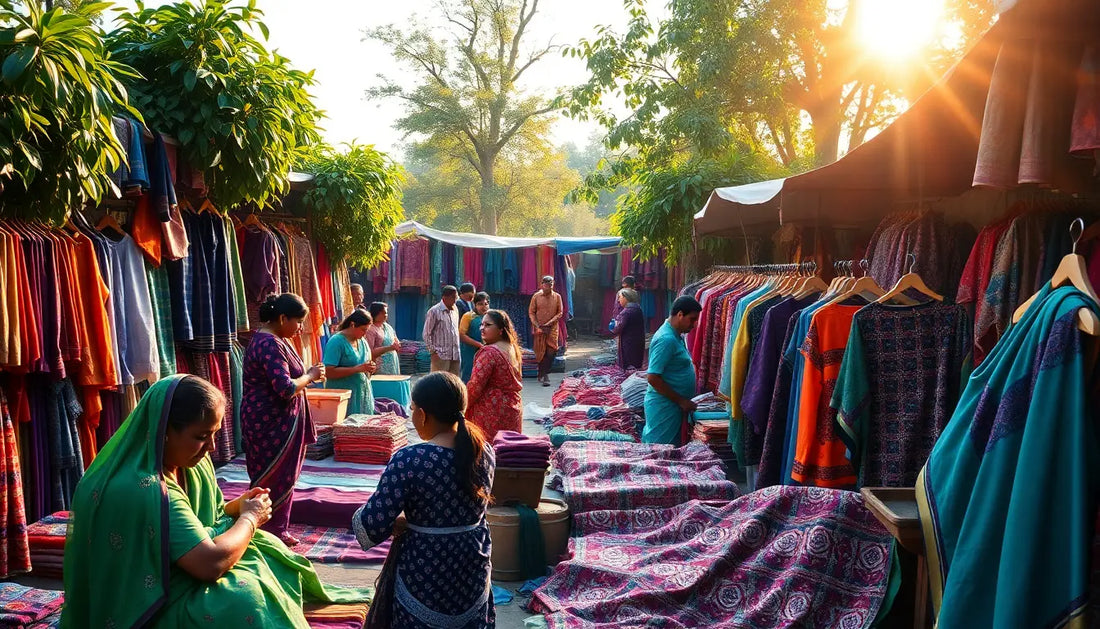In the ever-evolving world of fashion, where trends come and go, one thing remains constant: the desire for timeless, sustainable styles. And when it comes to Indian ethnic wear, Reyshaa is leading the charge in embracing eco-friendly practices that not only benefit the environment but also preserve the rich cultural heritage of the subcontinent.
Reyshaa, a premier online destination for high-quality readymade suits, dress materials, and sarees, has long been committed to championing sustainable fashion. As a brand that values authenticity and craftsmanship, Reyshaa has made it its mission to source materials and collaborate with artisans who share its vision for a greener, more ethical fashion industry.
The Rise of Sustainable Fashion
The fashion industry has long been criticized for its detrimental impact on the environment, from the excessive use of water and energy to the generation of waste and pollution. However, in recent years, there has been a growing awareness among consumers about the importance of sustainable fashion choices.
Consumers, particularly the younger generation, are increasingly demanding transparency and accountability from brands, pushing them to adopt more eco-friendly practices. This shift in consumer behavior has led to a surge in the popularity of sustainable fashion, with brands like Reyshaa leading the charge.
Reyshaa's Commitment to Sustainability
At the heart of Reyshaa's commitment to sustainability is its focus on sourcing high-quality, natural fabrics that are not only visually stunning but also environmentally friendly. From the use of organic cotton and linen to the incorporation of traditional weaving techniques, Reyshaa's products are designed to minimize their carbon footprint while preserving the rich cultural heritage of India.
One of the standout features of Reyshaa's sustainable approach is its partnership with local artisans and weavers. By collaborating with these skilled craftspeople, Reyshaa not only ensures the authenticity and quality of its products but also supports the livelihoods of these communities, many of whom have been practicing their craft for generations.
Organic and Natural Fabrics
Reyshaa's commitment to sustainability is evident in its use of organic and natural fabrics. From the soft, breathable cotton to the luxurious silk and the elegant linen, each fabric is carefully selected to minimize its environmental impact while delivering exceptional quality and comfort.
The brand's use of organic cotton, for instance, reduces the reliance on synthetic pesticides and fertilizers, which can have a detrimental effect on the soil and water resources. Similarly, the incorporation of natural dyes, such as those derived from plants and minerals, eliminates the need for harsh chemicals, further reducing the brand's environmental footprint.
Traditional Weaving Techniques
In addition to its focus on sustainable fabrics, Reyshaa also celebrates the rich cultural heritage of India by incorporating traditional weaving techniques into its designs. From the intricate Banarasi weaves to the delicate Chanderi fabrics, each piece is a testament to the skill and artistry of the weavers who have honed their craft over generations.
By preserving these traditional techniques, Reyshaa not only creates visually stunning garments but also supports the livelihoods of the artisans who are the custodians of this cultural legacy. This approach not only benefits the environment but also helps to sustain the vibrant tapestry of India's textile heritage.
The Impact of Reyshaa's Sustainable Practices
Reyshaa's commitment to sustainability has had a tangible impact on both the environment and the communities it serves. By sourcing organic and natural fabrics, the brand has reduced its carbon footprint and minimized its reliance on harmful chemicals and resources.
Moreover, the brand's partnership with local artisans has helped to support the livelihoods of these skilled craftspeople, many of whom have struggled to maintain their traditional practices in the face of industrialization and globalization.
Empowering Local Communities
Reyshaa's support for local artisans goes beyond just sourcing their products. The brand also invests in training and skill-building programs, helping these communities to develop new techniques and adapt to changing market demands.
This approach not only benefits the artisans themselves but also helps to preserve the rich cultural heritage of India's textile industry. By empowering these communities, Reyshaa is ensuring that the art of traditional weaving and embroidery continues to thrive, even in the face of modern fashion trends.
Reducing Environmental Impact
Reyshaa's sustainable practices have also had a tangible impact on the environment. By using organic and natural fabrics, the brand has reduced its reliance on synthetic materials and the harmful chemicals often used in their production.
Additionally, the brand's commitment to traditional weaving techniques, which often involve less water and energy-intensive processes, has further reduced its environmental footprint. This holistic approach to sustainability has positioned Reyshaa as a leader in the Indian fashion industry, inspiring other brands to follow suit.
Conclusion
In a world where fashion and sustainability are often seen as mutually exclusive, Reyshaa has proven that it is possible to create beautiful, high-quality garments while also prioritizing the well-being of the planet and the communities that sustain it.
Through its commitment to organic and natural fabrics, traditional weaving techniques, and empowering local artisans, Reyshaa has set a new standard for what it means to be a truly sustainable fashion brand. As consumers continue to demand more eco-friendly options, brands like Reyshaa will undoubtedly play a crucial role in shaping the future of the fashion industry.
So, the next time you're in the market for a stunning saree or a chic readymade suit, consider choosing Reyshaa – a brand that not only delivers exceptional quality but also champions the values of sustainability and cultural preservation.


